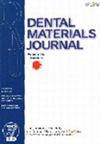Influence of resin-coating techniques on the marginal adaptation and the bond strengths of CAD/CAM-fabricated hybrid ceramic inlays.
IF 1.9
4区 医学
Q2 DENTISTRY, ORAL SURGERY & MEDICINE
引用次数: 0
Abstract
This study aimed to evaluate the effects of different resin-coating technique strategies and dual-cure resin luting materials on proximal marginal adaptation and the microtensile bond strengths (μTBSs) of CAD/CAM hybrid ceramic inlays. Extracted human molars were classified into four groups, depending on the coating technique: No coating (None), single coating (1-coating), double coating (2-coating), and flowable resin-coating (Combination). The inlays were bonded with one of the three materials: Panavia V5 (V5), Rely X Ultimate (RXU), and Calibra Ceram (CC). The differences with regard to adaptation were not significant. In the case of μTBS data for V5, no significant differences were observed, whereas for RXU, μTBS values for Combination statistically exceeded those for None and 1-coating. For CC, μTBS values for Combination statistically exceeded those for None, 1-coating, and 2-coating. The coating techniques did not influence the adaptation but influenced the bond strength, and Combination performed the best.树脂涂层技术对 CAD/CAM 制作的混合陶瓷嵌体的边缘适应性和粘接强度的影响。
本研究旨在评估不同树脂涂层技术策略和双固化树脂衬垫材料对 CAD/CAM 混合陶瓷嵌体近端边缘适应性和微拉伸结合强度(μTBS)的影响。根据涂层技术的不同,拔出的人类臼齿被分为四组:无涂层(None)、单涂层(1-coating)、双涂层(2-coating)和可流动树脂涂层(Combination)。嵌体使用三种材料中的一种进行粘合:分别是 Panavia V5(V5)、Rely X Ultimate(RXU)和 Calibra Ceram(CC)。适应性方面的差异并不明显。就 V5 的 μTBS 数据而言,没有观察到明显的差异,而就 RXU 而言,组合的 μTBS 值在统计上超过了无涂层和单涂层的值。对于 CC,组合的 μTBS 值在统计学上超过了无涂层、1 涂层和 2 涂层。涂层技术对适应性没有影响,但对粘接强度有影响,而组合涂层的性能最好。
本文章由计算机程序翻译,如有差异,请以英文原文为准。
求助全文
约1分钟内获得全文
求助全文
来源期刊

Dental materials journal
医学-材料科学:生物材料
CiteScore
4.60
自引率
4.00%
发文量
102
审稿时长
3 months
期刊介绍:
Dental Materials Journal is a peer review journal published by the Japanese Society for Dental Materials and Devises aiming to introduce the progress of the basic and applied sciences in dental materials and biomaterials. The dental materials-related clinical science and instrumental technologies are also within the scope of this journal. The materials dealt include synthetic polymers, ceramics, metals and tissue-derived biomaterials. Forefront dental materials and biomaterials used in developing filed, such as tissue engineering, bioengineering and artificial intelligence, are positively considered for the review as well. Recent acceptance rate of the submitted manuscript in the journal is around 30%.
 求助内容:
求助内容: 应助结果提醒方式:
应助结果提醒方式:


